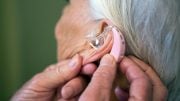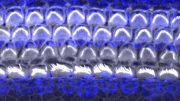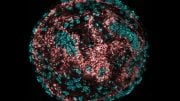
A new study published today, September 26, 2019, in The American Journal of Human Genetics has identified 44 genes linked to age-related hearing loss giving a much clearer understanding of how the condition develops and potential treatments.
In the study, researchers from King’s College London and UCL analyzed the genetic data from over 250,000 participants of the UK Biobank aged 40-69 years to see which genes were associated with people who had reported having or not having hearing problems on a questionnaire. 44 genes were identified to be linked with hearing loss.
By the age of 65, one-third of people are affected by some degree of hearing loss which can lead to social isolation and disability and has been identified as a risk factor for dementia.
Despite being a common impairment in the elderly, little is known about the causes of hearing loss and the only treatment option available is hearing aids which are often not worn once prescribed. The findings of this study will allow researchers to determine how the condition develops as we age and may identify potential targets for new therapies.
Co-lead author Professor Frances Williams, from the Department of Twin Research & Genetic Epidemiology at King’s College London, said: “We now know that very many genes are involved in the loss of hearing as we age. This study has identified a few genes that we already know cause deafness in children, but it has also revealed lots of additional novel genes which point to new biological pathways in hearing.”
Co-lead author Dr. Sally Dawson (UCL Ear Institute) said: “Before our study, only five genes had been identified as predictors of age-related hearing loss, so our findings herald a nine-fold increase in independent genetic markers.
“We hope that our findings will help drive forward research into much-needed new therapies for the millions of people worldwide affected by hearing loss as they age.”
The next steps in this research are to understand how each identified gene influences the auditory pathway, providing opportunities to develop new treatments.
Dr. Ralph Holme, Executive Director of Research at Action on Hearing Loss, said: “These findings are incredibly significant. We believe they will speed up the discovery of treatments to slow or even halt the progressive loss of hearing as we get older, something which happens to at least 70% of over-70-year-olds. This research was funded by us thanks to the generosity of our supporters and we know from people with hearing loss that being able to hear well again would completely transform their lives. The identification of these genes linked to age-related hearing loss throws open the door to many new lines of research into treatments.”
Reference: “GWAS Identifies 44 Independent Associated Genomic Loci for Self-Reported Adult Hearing Difficulty in UK Biobank” by Helena R.R. Wells, Maxim B. Freidin, Fatin N. Zainul Abidin, Antony Payton, Piers Dawes, Kevin J. Munro, Cynthia C. Morton, David R. Moore, Sally J. Dawson and Frances M.K. Williams, 26 September 2019, American Journal of Human Genetics.
DOI: 10.1016/j.ajhg.2019.09.008








Be the first to comment on "Hearing Loss Treatment Hope After New Genes Identified"